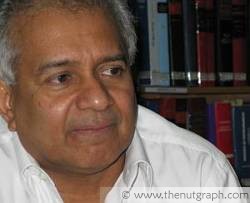Sultan Does Not Have The Power, Say Tommy Thomas
(TMI) – Contrary to previous claims, there will not be any constitutional crisis in Selangor if Datuk Seri Anwar Ibrahim wants to become the menteri besar, a prominent lawyer said today.
Tommy Thomas, a lawyer with almost 38 years of experience, dismissed claims by Edmund Bon – an activist and lawyer – that the state would go through a crisis even if current Menteri Besar Tan Sri Abdul Khalid Ibrahim decides to leave on his own accord.
"Whatever the outcome, there is no crisis – constitutional, political or otherwise – caused by the resignation of the Kajang member and Anwar's intention to contest in the ensuing by-election.
He explained that as a constitutional ruler, the Sultan of Selangor "does not have a free hand" in the selection of the menteri besar, citing Articles 51 and 53 of the state constitution.
Article 51(2) states that the candidate "must be of the Malay Race and profess the Muslim Religion" while Article 53(4) provides that His Highness may in his discretion dispense with provisions in the Constitution like Article 51 (2) which restricts his choice.
"Obviously, the menteri besar of any state must be a citizen of Malaysia but in Selangor there are no residential qualifications. Thus, he or she need not be born in Selangor nor have a permanent residence in the state," Thomas told The Malaysian Insider today.
He also quoted Article 53(2)(a) which states that the Sultan can only appoint a person as menteri besar if that person is a member of the state legislative assembly and who, in his judgement, is likely to command the confidence of the majority of the members of the assembly.
"The Federal Constitution and all the State Constitutions have identical provisions to Selangor's Article 53(2).
"They are all modelled on Westminster constitutions with the standard words 'commanding the confidence of the majority' of parliamentarians," he added.
Since the country achieved its independence in 1957, the political party (or coalition) that gains the most number of seats in general elections always selected its own leader, Thomas noted.
"So, in every case where there has been a vacancy in the office of the prime minister, whether caused by resignation or death, the acting leader of UMNO or Barisan Nasional was appointed the PM.
"Similarly, after each of the 13 general elections, the King had no discretion in such appointments. It is the same in the case of all the states. If there were exceptions in some states, the MBs were appointed without regard to constitutional niceties," Thomas said.

Tiada ulasan:
Catat Ulasan
Berikan pendapat anda sebanyak di sini.
Komen menyalahi undang-undang akan ditanggung oleh penulisnya..
Tapisan tidak dibuat di blog ini.
Cuma ulasan mencarut dan sewaktu dengannya akan dipadamkan.